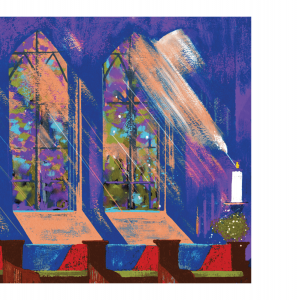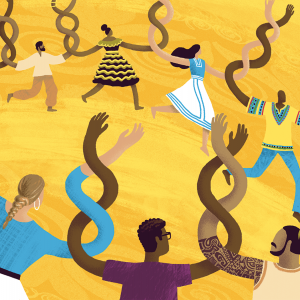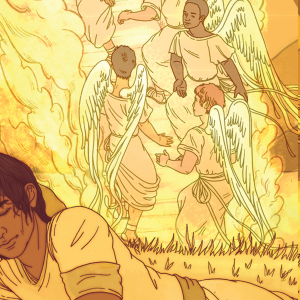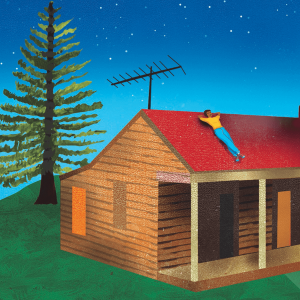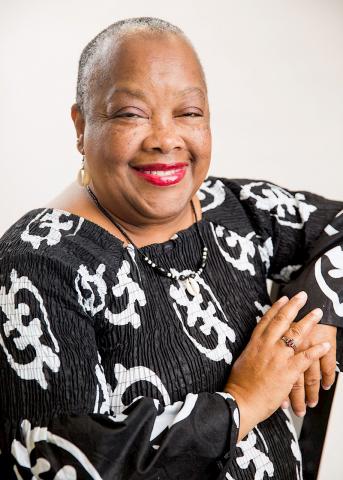
Valerie Bridgeman is dean and vice president of academic affairs and an associate professor of homiletics and Hebrew Bible at the Methodist Theological School in Ohio.
Posts By This Author
Building the Commonwealth of God
WE HAVE COME through a turbulent year in which health concerns, weather concerns, social unrest concerns, and more have been at the center of our thoughts. From the first time we heard “COVID-19” to the last storm of hurricane season to the deaths of many significant cultural icons in the U.S., we have found ourselves reeling—or at least I have, and so have many people I know.
Advent and the beginning of the Christmas season give us an opportunity to recalibrate and take a breath. We are into the new Christian calendar, and for Christians that reality should mean something. Expectation, hope, joy, and peace are just some of the Christian ways of leaning into life. Advent allows us to flex those faith muscles. And we need them, because, as the texts for the first days of Christmastide notes, the struggle under which we live does not dissipate. We live our Christian faith most often amid social crises. “Calm” and “peace” are aspirational at best. The reflections for this month try to make sense of how we flex those muscles I mentioned earlier. How do we participate in God’s desire for us to live together in just, holy, equitable ways? How do we hold ourselves and each other accountable to building the commonwealth of God, in which we each play our part, great or small, so that all are made whole?
Reading the Lectionary in a Time of Selfishness
EACH OF THESE reflections was written separately, not taking the others into consideration while writing each one. But as I reread them, there is a thread here. It is the thread of what it means to live faithfully together; what it means to do right by one another. Reflecting on love, accountability, economic justice, and what it means to have a righteous mind, I found myself thinking of each text in communal ways, rather than the ways I confess to typically having thought of them: “What do they mean for me, the individual?”
I am more struck by the selfishness I see, in these extraordinary times, when some people flat out refuse to do anything that they believe infringes on their individual rights. I believe that as followers of Jesus we are charged—called—to go beyond ourselves, even if we are socialized differently in our cultures or families. In addition, it is easy to settle into devotions that do not look beyond our own spiritual growth. But in these reflections, I have pushed myself to think about what it means to take in a larger view, to extend personal spiritual growth into the community. In some ways I am trying to reflect the Zulu concept of ubuntu, which indicates that a person is only human in relation to other humans. For me, by necessity, that means we must reach beyond ourselves. I hope these reflections will take you to that kind of humanity which, I believe, will deepen your faith in Christ.
September 6
The Love Debt
Exodus 12:1-14; Psalm 149; Romans 13:8-14; Matthew 18:15-20
“LOVE” IS A landmine word. It has come to mean expressions of sappy, gooey sentimentality. Because of this expectation, requiring the hard “verb” of love as a Christian commitment often gets dismissed. “Owe no one anything, except to love one another, for the one who loves another has fulfilled the law” (Romans 13:8). Every bit of the Romans text requires something more than good feelings. It calls us to examine our Christian debt. To “do no wrong” in a world where wrong stalks so many means we have to figure out how to “right the wrong.” What can it mean to “owe no one anything but love” when this nation robbed Indigenous Peoples of land and livelihood? It would be easy to say, “That was so long ago,” except the effects of that robbery extend into our present time.
It’s easy enough to name the damage, but how do we repair it? What does it mean to say, “Love does no wrong to a neighbor” (verse 10), when our trans siblings are being murdered and dismembered (as in the case of Dominique Fells in Philadelphia)? How do we provide safety? What does “Love your neighbor as yourself” (verse 9) mean in this Black Lives Matter moment of our culture, as we grapple with centuries-old sin against Black humanity? If we in fact owe one another love, then we owe one another justice, which includes repairing the damages done, individually and collectively, in community. It literally means reparation. It means doing so with an urgency, if we in fact believe “salvation is nearer to us now than when we became believers” (verse 11). For some, longing for Christ’s return can be an invitation to ignore the pain of now; but for me, it is the exact opposite. We are called to live honorably, which means to love righteously by “putting Christ on” (verse 14) and being the active love of God in the world by our deeds. Otherwise, it is not love.
Shoring Up Our Souls
FOLLOWING JESUS IS a mindset, a way of thinking as much as a way of being. In fact, one is not able to “be” a Christian without having a “change of mind,” a metanoia, the Greek word used in the New Testament for “repentance.” This change of mind or repentance, however, does not come from debates or argument. Rather, becoming like Christ is trying to figure out what it means to be one of his followers. “Lord, I want to be a Christian in my heart,” says the “Negro” spiritual. Depending on the version, the songwriter chooses to “be more loving,” “be more holy,” and “be like Jesus” for the verses that follow.
It may be fitting that we do not know who wrote this song or where it originates, except from the hardscrabble lives of enslaved people in the U.S. Imagine with me what it might have been like to sing these words under such suffering and brutal conditions in order to uphold a horrific system. But instead of reflecting passive acceptance, these words might have been a means to shore up enslaved persons’ souls so they could live antithetically to that system. It certainly works that way for me, in the face of death-dealing encounters and events. This month’s texts give us an opportunity to not only sing this song, but to meditate on it and do our best to practice it. Maybe we will become more Christian in our hearts and in our actions. We will have to want it.
October 4
Sharing in the Suffering
Exodus 20:1-4, 7-9, 12-20; Psalm 19; Philippians 3:4-14; Matthew 21:33-46
WHAT DOES IT mean to share in Christ’s suffering? I’ve bandied this question around in my mind for some time as I have pondered the Philippians text. Paul, of course, had shared in persecuting early believers before he became a convert himself. Trying to make sense and meaning of that suffering and people’s losses must have been a constant project for those trying to encourage the early church. Here, Paul takes on what it has meant to “lose everything.” His pedigree is impeccable; his credentials unassailable; his attendance to the law, meticulous. And yet, none of that matters to him after he committed to “knowing Christ Jesus” (verse 8). Those things—status and power—are on the trash heap as far as he is concerned. But what comes in its stead is suffering, even as he longs to “know Christ and the power of his resurrection” (verse 10). For Paul, you can’t get to the power of the resurrection without sharing in Christ’s suffering. But what does that mean?
Dreaming a Project of Freedom
RECOUNTING THE STORIES that shape our religious longings happens in the shade of uncertainty and fear. We remain in “Ordinary Time” but are besieged by a global pandemic with fallout the likes of which we cannot yet know. It would be easy to scapegoat people or to descend into fear. But we are called to live out our faith, even in difficult times—or maybe especially in difficult times.
We know we are constantly being shaped by our histories, in every way. Telling the stories of how we’ve come through in the past and grounding ourselves again in the firm foundation of our faith will, over time, reveal to us how that foundation shaped our lives in this season. It may embolden us to join God’s project of salvation, deliverance, and freedom for all creation. With Christ at the center of our lives, we have a constant invitation to return to the source and to center our lives in God in such a way that we see our responsibility to live, on behalf of this world, in the name of Christ. It pushes us beyond our circles of family and friends and helps us to see a larger connection, deeper relationships. Perhaps if we can get there, we will be able to see our need to repent from our self-absorption. We might be able to see that we are a web of relationships and—just as Moses needed the help of at least five women—that we need one another to survive.
August 2
Wrestling a Blessing
Genesis 32:22-31; Psalm 17:1-7, 15; Romans 9:1-5; Matthew 14:13-21
IN GENESIS 32, Jacob wrestles a blessing from the man at the river Jabbok, but not without cost. Jacob says he’s seen God face to face (32:30), something Moses would later be told is impossible. There has been much scholarship on whether the man with whom Jacob wrestles is God or an angel. The text is fully ambiguous. But it seems clear that Jacob wrestled in the night because he was afraid to face his past. He feared the coming confrontation with Esau.
I have had internal wrestling matches that have felt like I was in hand-to-hand combat with myself. Lately, I’ve been wondering whether our nation can wrestle with its internal beginnings, with its demons and angels—with its past. Recent events where Black people have died either in vigilante killings, such as Ahmaud Arbery in Georgia, or state-sanctioned police killings, such as the murders of Breonna Taylor and George Floyd, tell me we still have some communal wrestling to do, in hopes of finding a new name that includes “justice.” Jacob needed to win because from his lineage would come the patriarch from whom came the messiah who “God blessed forever” (Romans 9:5). If people will know God’s blessings, they must find a way to live into what is right for the sake of us all.
When Ordinary Time Is Anything But
ORDINARY TIME RARELY is. These texts in July fall in “ordinary” time on the Christian liturgical calendar, that time after the holy days of Lent, Easter, and Pentecost. I often think about the irony of this time being designated “ordinary,” since rarely is it ordinary or mundane. There usually is something going on in the world that demands our attention or causes us concern. Certainly, that is true in this season of the coronavirus. So “ordinary,” as we know it, is hardly an apt term.
The term “ordinary,” which comes from the “ordinal” numerals by which the weeks are counted, reflects that we are not in the season of “high holy” days, except for an occasional recognition of a saint or significant moment in history for the church writ large. Ordinary time is just under half of the Sundays on the calendar. It is the time when Christians recount the stories of their faith, across the biblical canon, in order to strengthen their commitments to discipleship and to study and reflect on what it means to be the people of God, both in one’s own life and in the community’s formation.
These Sundays in July capture the day-to-day nature of our faith. The parables in Matthew give us glimpses of God’s reign, tantalizing us. Paul’s letters remind us that sometimes we really struggle to become who God created us to be. The texts call us into curiosity, into covenant, into commitment, and into community. It is an extraordinary challenge.
July 5
Discerning Our Way
Genesis 24:34-38, 42-49, 58-67; Psalm 45:10-17; Romans 7:15-25; Matthew 11:16-19, 25-30
AT FIRST BLUSH, the Hebrew Bible texts for this week are all about finding and celebrating one’s mate for life. Abraham’s servant (Genesis 24:34) goes to find a wife for Isaac among Abraham’s kindred. Since the servant doesn’t know who they are, he must come to some way to discern. How will he know? He prays for success. He prays that the woman he finds will be willing to leave her family. And, like the bride in Psalm 45, Rebekah does indeed return with him. Here we read the end of the trip, but Genesis 24 begins with the servant’s angst about how to know.
How to know. These stories show us at least one way to know: Pray and look for signs. But looking for signs does not always work. Maybe it worked here because the servant did not ask for himself, but for Abraham’s sake. Maybe were he looking for himself, his own desires might get in the way. Perhaps that is what Romans 7 points toward. We are burdened with human nature that struggles to do the right thing, to find what the right thing is to do. Paul says, “nothing good dwells within me, that is, in my flesh” (verse 18). These words could be jarring to us. They are to me. I want to believe that we are fundamentally good at discernment, that our “flesh” (Paul’s word for our selfish nature) doesn’t drive our desires. But if I am honest, I must confess that it does.
It Will Not Always Be Thus: Where to Find Hope in the World Today

Image via MRo/Shutterstock.com
It is heartening to see that hope on display as the vision of a world where all flourish and human agency is honored and sustained. The vision on the website for Black Lives Matter is their Jeremiah’s “purchase ancestral lands.” It is Standing Rock’s protest. It is Breakfast and Book clubs springing up around the country. It is Freedom Schools. It is testament to the sentiment, “It will not always be thus.”
